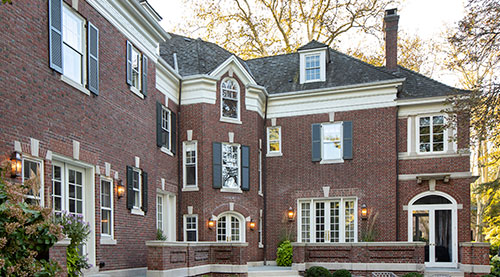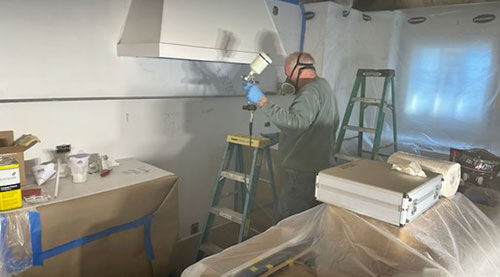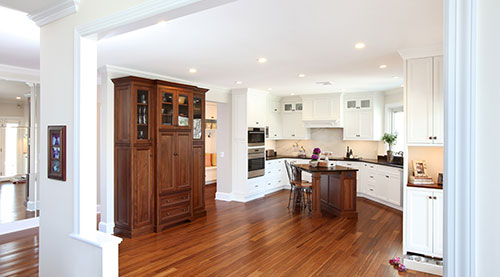
Detail-Oriented
Your guide to Design-Build
How to Choose an Architect
by Marc Brahaney, May 15th 2025
Hiring an architect is an exciting step in bringing your vision to life, whether you’re designing a dream home or renovating an existing space. However, it’s not just about finding someone with impressive designs—it’s about choosing the right professional who understands your needs, budget, and expectations.

The new three-car garage and mudroom addition were designed and built by our design-build team. Great efforts were made to match the original brick and limestone trim of the existing home.
Before reaching out to an architect, take time to clarify your project’s scope. Are you planning a new build, an addition, or a renovation? Do you have a specific design style in mind? Understanding your must-have features, budget, and timeline will help you communicate effectively and ensure you hire an architect who aligns with your vision.
Architects do much more than draw up plans. They help with design concepts, ensure compliance with local building codes, and consider structural integrity. Depending on the level of service you choose, they may also assist with cost estimates, contractor selection, and project management throughout construction. Some architects, such as those in a design-build firm, offer a full-service experience from concept to completion, while others provide only specific services like initial design consultation or permitting assistance.
When researching architects, you may notice various abbreviations after their names. These credentials indicate specific qualifications, certifications, and memberships. Understanding what these mean can help you assess their expertise:
-
RA (Registered Architect)
This means the architect is licensed to practice in their state. Registration requires completing a professional degree, gaining work experience, and passing the Architect Registration Examination (ARE). -
AIA (American Institute of Architects)
An architect with "AIA" after their name is a member of this professional organization, which promotes industry standards, ethics, and continuing education. While not a licensing requirement, it signifies a commitment to professional excellence. -
FAIA (Fellow of the AIA)
This is an honorary title given to AIA members who have made significant contributions to the field of architecture. -
LEED AP (Leadership in Energy and Environmental Design Accredited Professional)
This certification, awarded by the U.S. Green Building Council, indicates expertise in sustainable and environmentally friendly design. -
NCARB (National Council of Architectural Registration Boards)
If an architect has “NCARB” certification, it means they meet national standards and can more easily become licensed in multiple states. -
CSI (Construction Specifications Institute) Certifications
Some architects may hold CSI credentials like CDT (Construction Documents Technologist), which demonstrates expertise in construction documentation and contract administration.
Understanding these designations can help you determine if an architect has the specialized knowledge you need, whether it’s sustainable design, advanced technical expertise, or a commitment to professional development.
Not all architects are the same, and their expertise varies depending on the type of projects they handle. Researching architects who specialize in your type of project is essential. Look through portfolios to see if their past work aligns with your aesthetic and functional needs. Reading client reviews and requesting references is a great way to gain insight into their work ethic and reliability.
Once you have a shortlist, set up interviews to discuss their experience and approach. Ask about their past projects, design philosophy, and how they handle budget constraints. It’s also important to clarify their fee structure. Architects may charge a fixed fee, an hourly rate, or a percentage of the total construction cost. Make sure their pricing model works for your financial plan.
Another important consideration is communication. A successful architect-client relationship requires clear and consistent communication. Ask how they handle project updates, what the process is for revisions, and how unexpected challenges will be addressed.
Before hiring an architect, review the contract carefully. It should outline the scope of work, payment terms, project timelines, and how design changes will be handled. Ensure they are licensed in your state and carry professional liability insurance to protect yourself from potential issues down the line.
Choosing an architect is about more than just design—it’s about finding someone who listens to your needs, respects your budget, and communicates effectively. Taking the time to research, ask the right questions, and clarify expectations will set you up for a smoother, more successful project.
Ready to explore your options?
At Lasley Brahaney Architecture + Construction, we bring over 35 years of experience to every project, from thoughtful renovations to custom-built homes. Call us at (609) 921-2822 or send us a message to schedule a conversation about your vision.
 Countertops
Countertops
February 15th 2026 Renovation Timeline
Renovation Timeline
January 15th 2026 The Lasley Brahaney Story
The Lasley Brahaney Story
December 15th 2025 Finding the Fit
Finding the Fit
November 15th 2025 A More Energy-Efficient Home
A More Energy-Efficient Home
October 15th 2025 Purchasing Land
Purchasing Land
September 15th 2025 Renovate, Buy or Build
Renovate, Buy or Build
August 15th 2025 How to Budget for a Home Renovation
How to Budget for a Home Renovation
July 15th 2025 When to Hire an Architect
When to Hire an Architect
June 15th 2025 Why Choose Design-Build?
Why Choose Design-Build?
April 15th 2025 Surviving Construction
Surviving Construction
March 15th 2025 Aging in Place
Aging in Place
February 15th 2025 Choosing Paint and Finishes
Choosing Paint and Finishes
January 15th 2025





